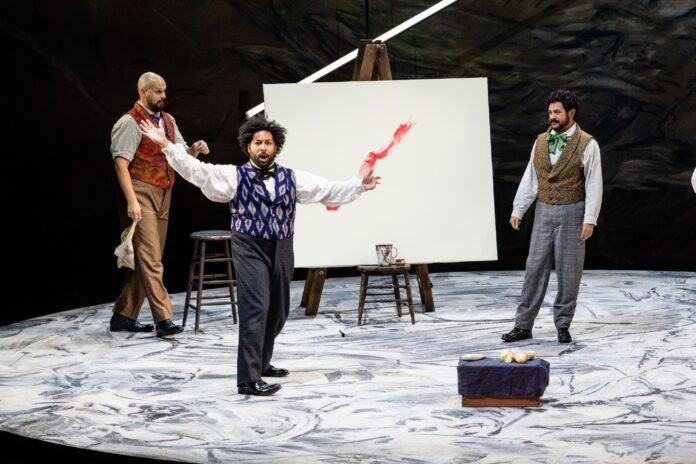When many people think of opera, their minds go immediately to “La Bohème.” Puccini’s 1896 classic about tragic young love in Paris holds the record of most performed work in the Metropolitan Opera’s history, and a production is almost always playing at some opera house in the world at any given moment.
Opera Philadelphia has produced this perennial favorite multiple times, most recently in 2019. But when the work returns to the Academy of Music stage under their auspices on April 28, it will be in a totally new format. While hardly altering a note of the music or changing a single character, director Yuval Sharon has devised a new way of viewing the opera that will intrigue aficionados and newbies alike.
In Sharon’s retelling, the action takes place in reverse, beginning with Mimì’s untimely death and progressing forward to the blossoming of love between her and Rodolfo. Promotional materials describe the concept as “a new journey – from tragedy to hope, death to life, loneliness to love.”
Sharon had been toying with the idea of presenting a classic opera in this fashion for some time. “It came about in a conversation with the set designer for this production, John Conklin,” he told PGN during a break from rehearsals. “We talked about it almost as a thought experiment: wouldn’t it be great to start thinking about opera in this way, where we could cut and paste and shuffle the works? John mentioned ‘Bohème’ specifically, because if it just started with Act 4, an audience might not actually know it’s the end, because of how similar the music is between the beginning of Act 4 and the beginning of Act 1.”
Sharon compared the structure to films like Gaspar Noé’s “Irréversible” and Christopher Nolan’s “Memento,” where the altered timeline becomes a narrative device. Each act is built around a distinct theme, with Death unifying the action in Act 4 and Love as the primary focus in Act 1. Act 3, which is set in a barracks on the outskirts of Paris, represents the barriers between people, while the joyous Act 2 – set on Christmas Eve in the Latin Quarter – fosters a feeling of celebration and revelry.

“La Bohème” also considers the complexities of relationships, and Sharon decided to focus on three distinct couples. In addition to the central pair of Rodolfo and Mimì, the action also follows the tempestuous second couple, Marcello and Musetta. In this production, the musician Schaunard and philosopher Colline are also conceived as a same-sex couple.
There is precedence for this idea in contemporary pop culture: Schaunard and Colline are the basis for Angel and Collins in Jonathan Larson’s “RENT,” the classic rock musical adaptation of “La Bohème.” Sharon saw the potential for their elevation as a couple in the original work as a matter of material hiding in plain sight.
“I kept thinking it would be so strange if Colline and Schaunard were part of this story about restless, youthful love, and they don’t have any love interests,” Sharon said. “It seemed very clear to me that, actually, it makes sense that they are the third couple in this piece. In the reverse order, these two characters really get foregrounded for the audience early on, and working backwards, it really works out quite nicely.”
“I love how it creates a further specificity to the characters,” said bass Adam Lau, who is singing Colline at Opera Philadelphia. “In other productions, it’s suggested that they’re close, but it wasn’t very defined. It adds another level of intimacy to the story and makes it a lot more poignant.
The production first opened last April at Detroit Opera, where Sharon is artistic director. It then traveled on to Boston Lyric Opera and the Spoleto Festival in Charleston, S.C., before coming to Philadelphia. Baritone Benjamin Taylor, who sings Schaunard, is the only artist who has appeared in all four iterations of the production.
“The arc of Schaunard and Colline’s relationship really works with the way the story is told here,” Taylor said. “Traditionally, there are other events that are happening that might overshadow it, because it’s not the main arc of the story. This way, we can really show all the ins and outs of our relationship, and go back to show the origin point and beginning sparks in the first act.”
Going into the Philadelphia premiere, Sharon said the reaction to the piece has been overwhelmingly positive from all corners.
“For people who know ‘Bohème’ very well, they get to experience it as if they are hearing it for the very first time,” he said. “And if you are seeing it for the very first time, there is a wonderful sense of mystery and connection to other narrative forms that we might be used to. When we did it in Detroit, I was excited to see that a lot of newcomers to opera were not at all confounded by the idea or found it difficult to follow. They just kind of went along with it.”
Opera Philadelphia’s production of “La Bohème” runs April 28-May 7 at the Academy of Music (240 S. Broad Street). For tickets and information, visit operaphila.org/.

